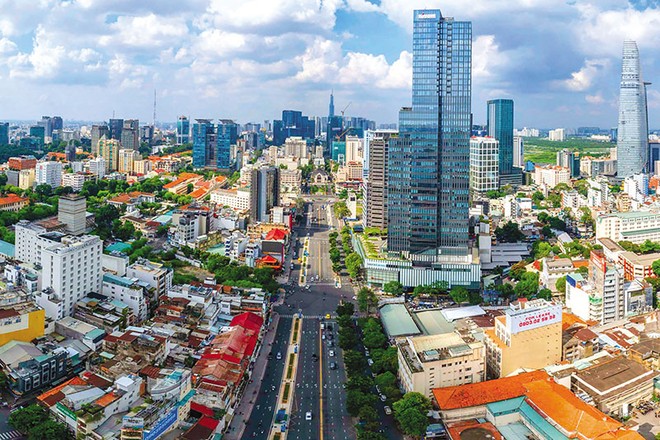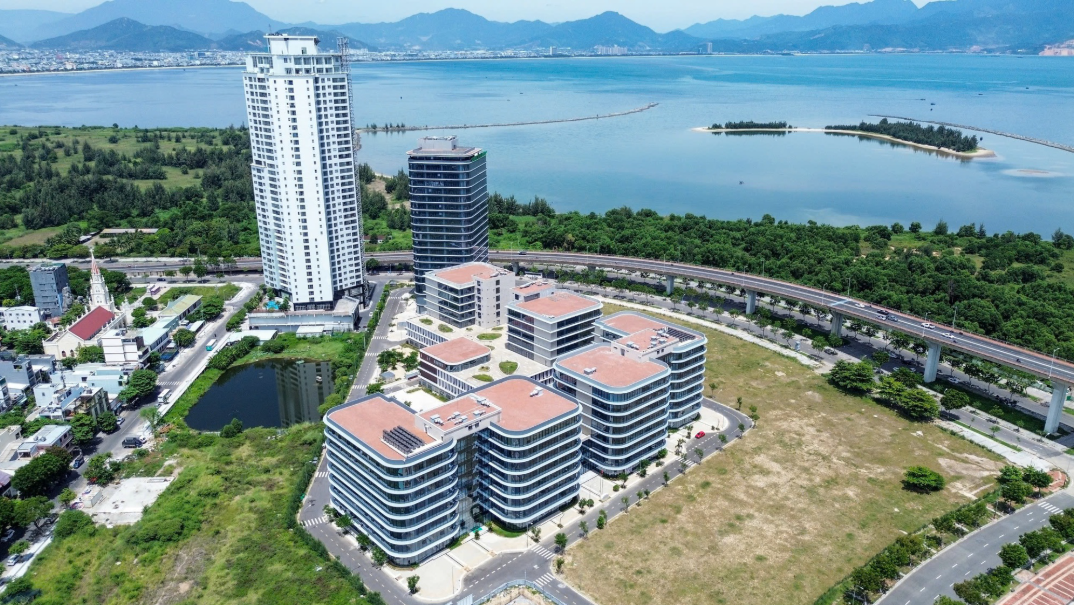Through a comprehensive framework of policies - from tax incentives and flexible foreign exchange mechanisms to labor support and infrastructure development - the resolution aims to foster a globally competitive environment that attracts international financial institutions and empowers domestic enterprises to grow.
In this context, CDR Counsels has conducted an in-depth analysis of the Center’s operational model, its priority policy instruments, and the potential economic and legal impacts it may bring to Vietnam and the broader investment community.
Under Resolution No. 222/2025/QH15, Vietnam’s International Financial Center is envisioned as an aircraft taking off into the skies of global financial integration - powered by two synchronized “engines”: a dual-policy framework operating on a foundation of modern legal infrastructure. In this design, Da Nang serves as the experimental zone, piloting emerging financial technologies such as tokenized assets, digital finance models, and technology sandboxes within a tightly controlled environment.
Meanwhile, Ho Chi Minh City is tasked with upholding international standards of transparency, oversight, and financial governance. This model reflects not only strategic foresight but also a bold restructuring of Vietnam’s reform landscape one that embraces global integration while preserving operational sovereignty.

The International Financial Center is not merely an infrastructure investment project; it is a high-level policy declaration, signaling the State’s firm commitment: “The rules of the game here will remain stable over the long term.” With its geopolitical position and economic potential, Vietnam is well-positioned to become the financial trust hub of ASEAN, especially in areas such as green finance, multi-currency regional payments, legal asset digitization, and regulated financial sandboxing.
This institutional architecture enables Vietnam to become a “regulatory harbor”, a place where international investors can experiment with innovation without abandoning established norms. In an era dominated by mega financial centers, simply becoming a transit point for trust is enough to make Vietnam an indispensable link in the global financial chain. And once trust is established, international capital will flow in not through invitation, but through readiness.
To realize this vision, the Center must be embedded within a special institutional zone - a national-level financial regulatory sandbox, fundamentally different from conventional fintech sandboxes. This is a distinct jurisdictional space, not defined by administrative boundaries, where global financial institutions can: Conduct cross-border asset transactions, issue digital financial instruments such as green bonds and real estate tokens and choose governing laws aligned with international practices.

The Resolution’s breakthrough provision allows commercial disputes, excluding land-related issues to be governed by international law. Notably, the Center maintains two dispute resolution mechanisms, including a specialized court that applies common law and uses English as its primary language.
This is a bold move, creating a “legal oasis”, a safe and familiar environment for Western investors right within Vietnam. It reduces legal friction, enhances transparency, and strengthens confidence in the national investment climate.
>> LEARN MORE: What Are the Requirements for Enterprises to Provide Intermediary Payment Services in Vietnam?
Vietnamese entities operating within the International Financial Center (IFC) are permitted to use foreign currencies for transactions, payments, and valuations. This applies to both internal transactions among IFC members and dealings with foreign partners. However, transactions with non-members within Vietnam’s territory must still comply with current foreign exchange regulations.
Foreign investors are allowed to transfer capital, profits, and other lawful income in and out of the IFC via foreign currency accounts held at licensed financial institutions. This policy introduces a high degree of flexibility for international financial operations, helping mitigate exchange rate risks and enhancing Vietnam’s appeal to global capital flows.

Nevertheless, such openness also carries risks of capital volatility, especially amid increasingly complex global financial markets. Therefore, Vietnam must establish robust monitoring mechanisms to ensure effective oversight of capital flows both within the IFC and across the national financial system.
Corporate Income Tax (CIT):
Priority projects in the IFC enjoy a preferential CIT rate of 10% for 30 years, with up to 4 years of full exemption and 50% reduction for the following 9 years.
Other projects receive a 15% CIT rate for 15 years, with up to 2 years of exemption and 50% reduction for the next 4 years.
Personal Income Tax (PIT):
Experts, managers, and investors - both domestic and foreign - are exempt from PIT until the end of 2030.
Individuals earning income from capital transfers (e.g., shares, equity, capital contribution rights) are also exempt from PIT until 2030.

Import-Export Tax:
Goods circulating within the IFC benefit from preferential tax rates and streamlined customs procedures, facilitating international trade.
These tax incentives serve as powerful tools to attract high-quality enterprises and skilled professionals. Compared to Vietnam’s standard CIT rate of 20%, the 10–15% rates offered in the IFC are highly competitive.
However, long-term effectiveness requires a clear strategy to assess the real value added from tax exemptions. Vietnam must also carefully consider its international commitments to avoid unintended legal risks when implementing special policies that may affect non-members.
>> LEARN MORE: Opportunities and challenges when participating in the regulated sandbox mechanism in vietnam's banking sector
Strategic investors, experts, and skilled foreign workers in the IFC will be granted visas and residence permits for a minimum of one year, with simplified administrative procedures. IFC members have autonomy in determining salary and bonus structures, and will receive state-funded training support for four years starting in 2026.
This policy plays a vital role in attracting global talent, an essential factor for building a leading financial hub in the region. However, prioritizing foreign labor without a parallel strategy to upskill the domestic workforce may lead to imbalanced competition in the local labor market.

Both domestic and foreign workers in the IFC are entitled to social insurance, health insurance, and unemployment insurance. Foreign workers with equivalent coverage in their home countries may be partially exempt from contributions.
Local governments will also implement housing and social welfare support for IFC workers. These measures not only safeguard labor rights but also foster a professional and sustainable working environment. Nonetheless, differences in insurance mechanisms between IFC and non-IFC workers call for policy adjustments to ensure social equity and legal consistency.
The IFC is prioritized for modern infrastructure development over a 10-year period, funded by state budget and other lawful sources. Investors may advance capital and receive deductions or reimbursements, while imported equipment for the project is tax-exempt.
Given the scale of investment, effective financial management is essential to avoid waste and resource leakage. In the context of Vietnam’s need for additional development capital, Public-Private Partnerships (PPP) are seen as optimal solutions to reduce fiscal pressure and enhance private sector participation. Mobilizing non-state actors not only diversifies funding sources but also promotes transparency, efficiency, and innovation, key pillars for a successful and sustainable IFC.

Vietnam is gradually implementing a “sandbox” mechanism, a controlled testing environment for new financial and technological models under close regulatory supervision. Participating organizations are temporarily exempt from certain legal requirements, allowing them to validate the feasibility of products and services before full-scale deployment.
Priority areas include fintech, green finance, digital assets, and open banking, with pilot programs in IFCs located in Ho Chi Minh City and Da Nang. These centers will be allowed to establish dedicated trading platforms, apply advanced technologies such as AI, blockchain, and big data, and deploy solutions for digital payments, asset tokenization, and cross-border transfers.
Vietnam’s focus on these sectors reflects a strategic vision aligned with global trends in sustainability and digital transformation, reaffirming the Party and State’s commitment to a knowledge-based economy. To remain internationally competitive, Vietnam must invest heavily in research and development (R&D) and build a flexible, transparent, and adaptive legal framework.

>> LEARN MORE: Comprehensive Q&A on dispute resolution in Vietnam by CDR Counsels on Lexology Panoramic Guide
|
Criteria |
Banking Sandbox (Decree 94) |
IFC Sandbox Model |
|
Scope of Testing |
Bank-related fintech: P2P lending, Open API, credit scoring |
Broader: digital assets, crypto, green finance, new trading platforms |
|
Duration |
Up to 2 years, extendable |
Flexible based on specific models |
|
Eligible Participants |
Domestic banks and fintech firms |
Includes foreign entities and innovative startups |
|
Primary Objective |
Financial inclusion, banking modernization |
Investment attraction, new growth drivers, regional competitiveness |
An upcoming Government Decree will clarify participation criteria, testing procedures, oversight mechanisms, and specific incentives. This legal framework will be crucial for investors to assess risks, opportunities, and determine their engagement with Vietnam’s emerging financial ecosystem.

>> LEARN MORE: What Businesses Need to Prepare to Renew a License for Provision of Payment Intermediary Services
Disputes arising within the IFC may be resolved through courts, domestic or international arbitration, depending on mutual agreement. A key provision in Resolution 222 allows for the establishment of an arbitration center under the IFC, creating a distinct, specialized, and flexible dispute resolution framework.
This demonstrates Vietnam’s proactive effort to build a customized legal system tailored to the complexity of international financial transactions. The internal arbitration mechanism expands investor options and reinforces the State’s commitment to protecting legitimate rights and ensuring a transparent and efficient investment climate.
.jpg)
However, the success of this mechanism depends on the quality of legal institutions, the expertise of arbitrators, and the enforceability of rulings. Investors expect a system that is fast, fair, and globally aligned, not only within the IFC but across Vietnam’s broader financial landscape.
With 13 special policy measures outlined in Resolution 222, the IFC offers a bold yet pragmatic vision, aiming to position Vietnam as a premier destination on the global financial map. Realizing this vision requires decisive government action to refine legal frameworks, invest in regulatory infrastructure, and support market participants in enhancing competitiveness and meeting international standards.
>> LEARN MORE: Legal framwork for fintech in Vietnam

As a reputable legal advisory firm, CDR Counsels continuously updates and deeply analyzes policy and legal changes, especially on strategic issues like the International Financial Center. We commit to accompany businesses and investors in seizing opportunities, optimizing benefits, and complying with laws, contributing to the sustainable development of Vietnam’s economy.
Are you looking for a trusted legal partner to guide you on your integration and development journey? Contact CDR Counsels today for the most professional and comprehensive consultation!